

Place-names in The Danelaw. One of the most noticeable differences between The Danelaw and the rest of England is that it contains many hundreds of place-names which are Scandinavian in origin.
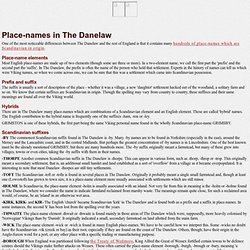
Place-name elements Most English place-names are made up of two elements (though some are three or more). BBC History Magazine. Dan Carlin - Homepage. History of English Place-Names. Articles > Names A Survey of the History of English Placenames By Dame Cateline de la Mor la souriete The subject of English placenames is a complicated one.
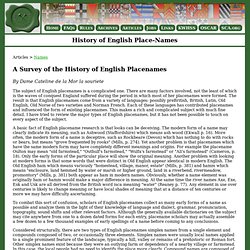
There are many factors involved, not the least of which is the waves of conquest England suffered during the period in which most of her placenames were formed. The result is that English placenames come from a variety of languages: possibly preBritish, British, Latin, Old English, Old Norse of two varieties and Norman French. A basic fact of English placename research is that looks can be deceiving. The History of Rome. Toponymy. A Medieval English Calendar. N.B.
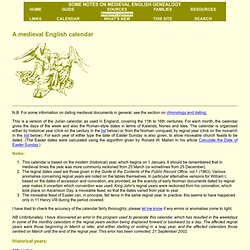
For some information on dating medieval documents in general, see the section on chronology and dating. This is a version of the Julian calendar, as used in England, covering the 11th to 16th centuries. For each month, the calendar gives the days of the week and also the Roman-style dates in terms of Kalends, Nones and Ides. The calendar is organised either by historical year (click on the century in the list below) or, from the Norman conquest, by regnal year (click on the monarch in the list below). For each year of either type the date of Easter Sunday is also given, to allow moveable church feasts to be dated.
Notes: This calendar is based on the modern (historical) year, which begins on 1 January. I have tried to check the accuracy of the calendar fairly thoroughly; please let me know if any errors or anomalies come to light. Historical years: English Place Names. Anglorum - Regia Anglorum - Anglo-Saxon, Viking, Norman and British Living History 850-1150AD. Regia Anglorum was a term used by early English writers to describe the English state.
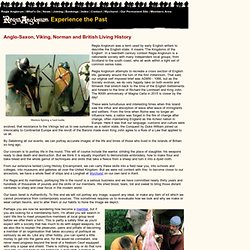
It means 'The Kingdoms of the English'. In a twentieth century context Regia Anglorum is a nationwide society with many independent local groups, from Scotland to the south coast, who all work within a tight set of common sense rules. Regia Anglorum attempts to recreate a cross section of English life, generally around the turn of the first millennium. That said, our original self imposed brief was AD950 - 1066, but as the Society evolves, we do very happily take on both events and filmwork that stretch back to the time of the English Settlements and forward to the time of Richard the Lionheart and King John. The 800th anniversary of Magna Carta in 2015 is closer by the day! These were tumultuous and interesting times when this island saw the influx and absorption of wave after wave of immigrants and settlers. Our concern is to portray life in the round. Our basic tenet is Authenticity. The Ancient Maya and their origins. The Maya were a civilization that devoted much of their time to the worship and study of the cosmos and celestial bodies.
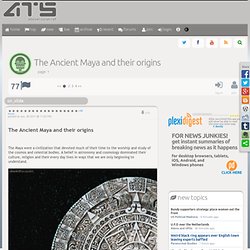
A belief in astronomy and cosmology dominated their culture, religion and their every day lives in ways that we are only beginning to understand. The Maya lived their lives by a very complex calendar that was based upon the movements of the stars and planets, and while many of their beliefs and practices may appear to be nothing but superstition, it seems evident that their calendar was based upon real events and real movements in the sky that do in fact have an effect on the Earth. In Mayan society a belief in astronomy and in the importance of the movements of celestial bodies was utterly essential to their culture and to how they conducted their everyday lives, and while some of their practices can certainly fall under the “superstition” banner some of their beliefs and practices can not be easily rejected and definitely had a profound effect on their lives. Medieval Naming Guides: English Names 1300 to 1450. Feminine Given Names in A Dictionary of English Surnames, by Talan Gwynek This dictionary, by P.
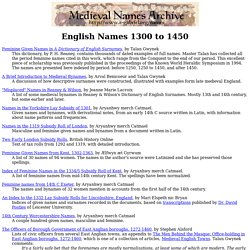
H. Reaney, contains thousands of dated examples of full names. Master Talan has collected all the period feminine names cited in this work, which range from the Conquest to the end of our period. This excellent piece of scholarship was previously published in the proceedings of the Known World Heraldic Symposium in 1994. A Brief Introduction to Medieval Bynames, by Arval Benicoeur and Talan Gwynek A discussion of how descriptive surnames were constructed, illustrated with examples form late medieval England. "Misplaced" Names in Reaney & Wilson, by Jeanne Marie Lacroix. Institute for Name Studies. Meanings of Irish place names.